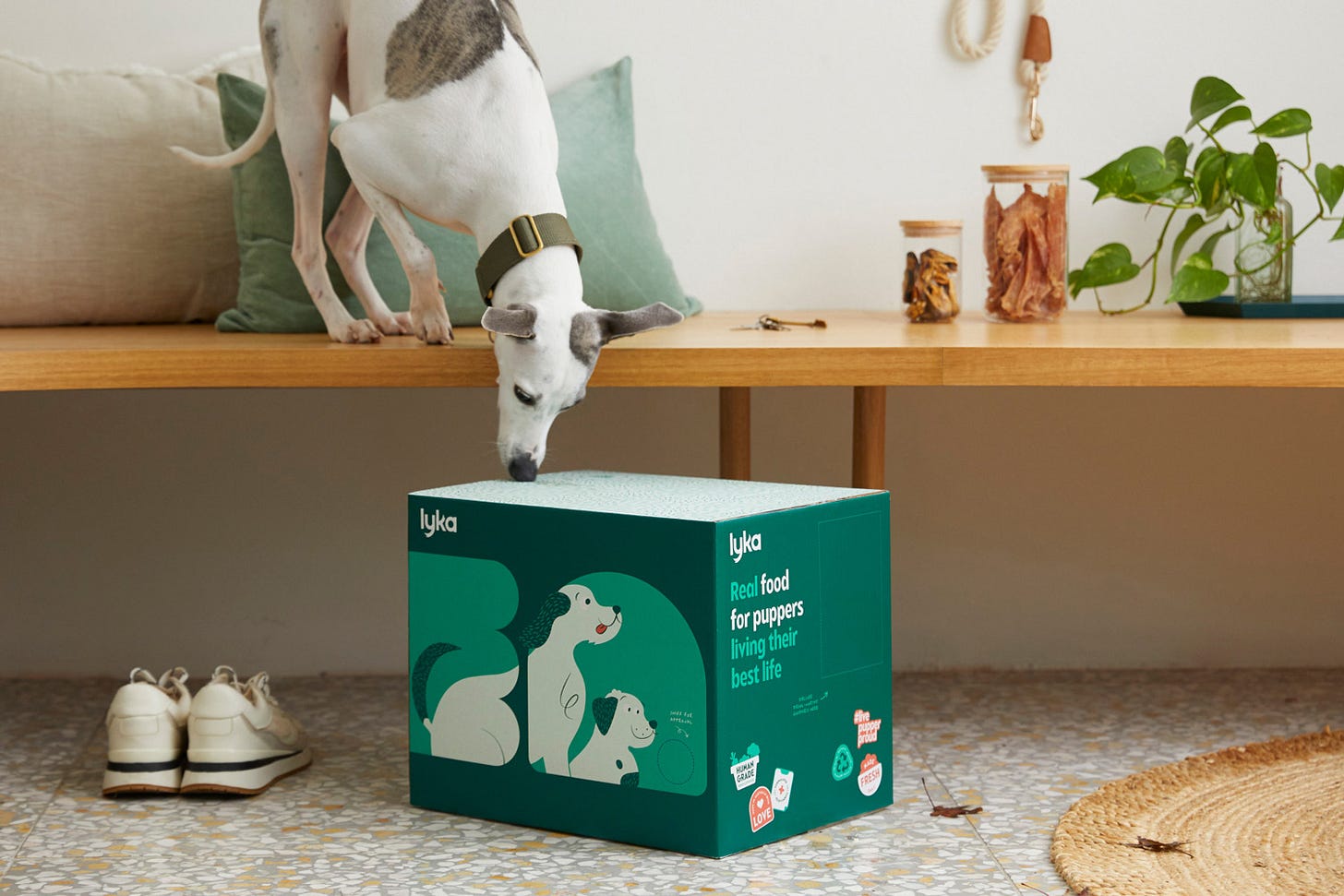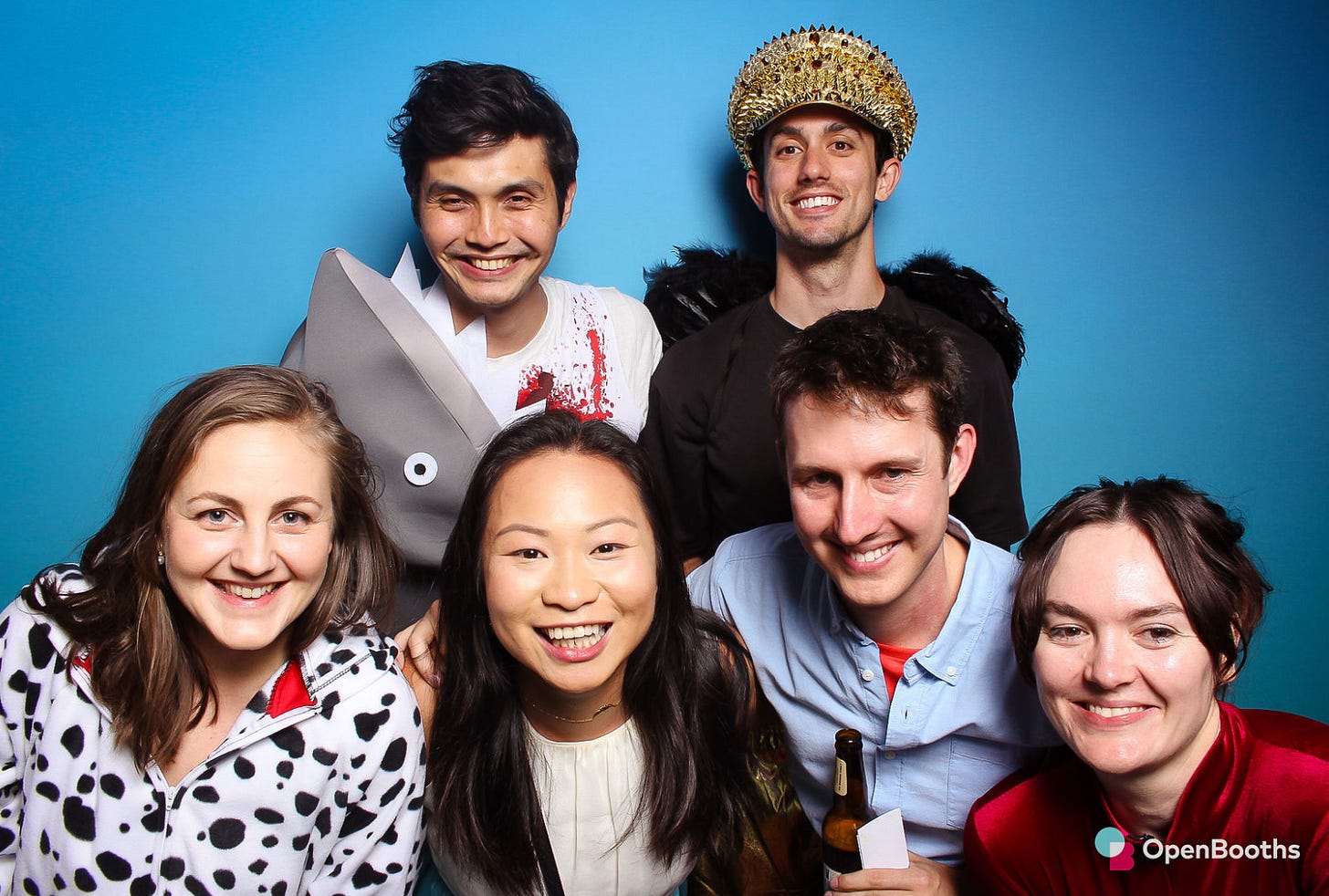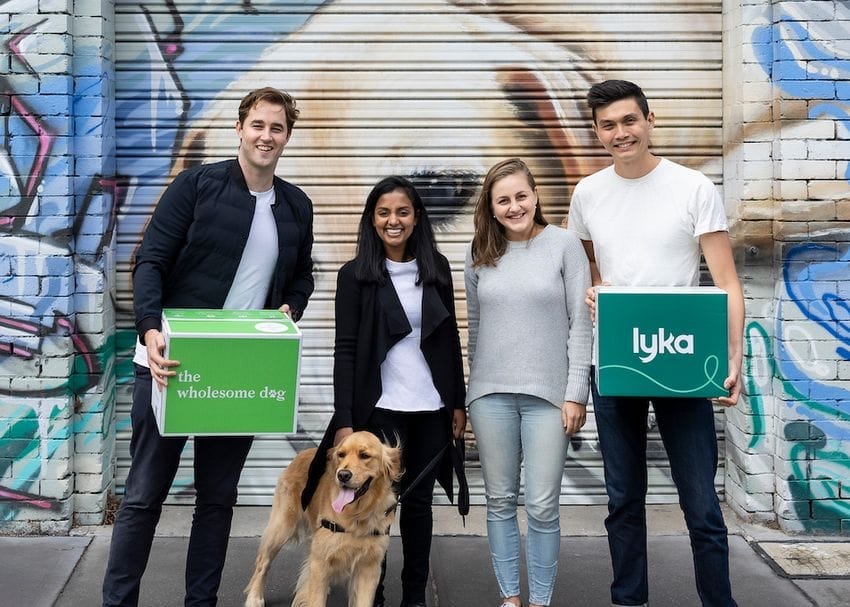Celebrating Lyka's Series B+: What we've learned since our initial investment
We've been investors in Lyka since early 2021 - we're delighted that they've just closed a $25m Series B+ led by Stepstone Group. Here's what we've learned from our investment so far.
Lyka is a company driving a revolution in pet wellness through preventive, holistic, and personalised care. Its first product is human-grade, lightly cooked pet food that helps dogs to live their best lives.
AfterWork first invested in Lyka in early 2021: when their small but mighty team had served one million bowls to happy dogs. Lyka has experienced extraordinary growth over the last two years - they are just weeks away from serving twenty million bowls!
What’s more - Lyka’s growth is accelerating: it was just last September that the team celebrated the 10 million bowls milestone.
Their growth has been highly efficient - in addition to increasing volume twenty times, they’ve added two product lines (healthy dog treats and wholefood supplements), launched two new distribution channels, and are now available in every state in Australia.
Along the way, members of the AfterWork community have joined the Lyka pack as team members, and Lyka’s founders Anna and GG have helped an innumerable number of AfterWork’s portfolio companies.
We’re delighted to celebrate a major milestone for Lyka - their $25 million Series B+ raise, led by global investor StepStone Group with participation from Shearwater and Point King Capital. AfterWork participated in this round through a Special Purpose Vehicle (SPV) we made available to our investors.
In these notes, we discuss what our original thesis got right, what surprised us, and what we’ve learned along the way.
What we got right
Modern pet owners are cottoning onto Big Kibble’s deception
The global market for pet food is $100 billion, and it is dominated by kibble - a highly processed form of dried food. Made of poor quality grains, legumes, meat and vegetables, kibble is scorched at up to 300°C, a process which releases two kinds of carcinogens. Additionally, extended time on shelves produces aflatoxins, which is also carcinogenic.
Many studies on dog nutrition have shown that fresh, lightly cooked dog food has many benefits when compared to kibble:
Easier to digest: A breakthrough study has shown that that human grade fresh food is easier for dogs to digest than kibble.
Promotion of gut health: The same study showed that dogs who ate fresh food had more diverse microbiomes. Multiple studies have found that lower diversity is associated with various diseases like inflammatory bowel disease, obesity, type 1 and type 2 diabetes, and psoriatic arthritis.
High carbohydrate kibble may be difficult for dogs to digest: Dogs make glucose from protein and wild dogs have eaten 3% carbohydrate diets for millennia. There are no studies on dogs that support the safety of feeding 50% carbohydrate diets. While dogs have evolved some digestive enzymes to deal better with carbohydrates, this does not mean that they are necessarily thriving on a high carbohydrate kibble diet.
Despite Big Kibble’s best efforts to gloss over shortcomings, modern pet owners are wisening up to the fact that lightly-cooked, nutritionally dense meals can have a transformative impact on their dog’s health.
What surprised us
D2C moats are built in product and operational excellence - not marketing
In our last investment notes in Lyka, we discussed the operational complexity involved in running a direct-to-consumer business that researches, develops, and manufactures its product in-house.
You need facilities and equipment, the ability to source fresh ingredients at scale, the ability to distribute a perishable product across the country. To succeed, you must have tight control on quality assurance, inventory management, production forecasting, and capex management. These hairy complexities test the mettle of the most steely and seasoned founders.
Some founders try to sidestep these operational complexities by using third party manufacturers such as Atelier. While this approach accelerates time to market and allows for quicker iteration, it sacrifices the ability to build towards a differentiated products with economies of scale over time.
Instead of spending investors’ money acquiring customers and subsidising their orders - Lyka has always been gross profitable, with a CAC (customer acquisition cost): CLTV (customer lifetime value) ratio that would be enviable to many software companies. The lion’s share of the venture capital Lyka has raised has been invested in strengthening their moat and further improving unit economics - including developing two state-of-the-art manufacturing facilities in Sydney and Melbourne, capable of manufacturing hundreds of tonnes of food every week.
Lyka’s control over its supply chain has allowed it to defend gross margins without increasing price. Even when faced with supply chain disruption and inflation on the price of meat and vegetables, they have been able to keep prices constant for almost two years.
In addition, Lyka’s superior economics have given them confidence to acquire three smaller operators - including Happy Tales and The Wholesome Dog.
What we’ve learned along the way
You can’t brute force your way to customer care
There’s an emerging belief that brand building is more science than art; more mercenary than missionary; more formulaic than inspired.
However, we’ve seen Lyka’s most memorable initiatives come from a place of deep customer empathy, rather than a marketing playbook.
Additionally, Lyka demonstrates that when organisations are genuinely mission-driven, it percolates into all aspects of the organisation. The team’s dedication to animal welfare and environmental sustainability goes beyond lip service a - it is deeply embedded into its business operations.
For example, Lyka will be the first company in Australia to pioneer a bioplastic packaging - made from sugar cane rather than fossil fuels. When farmers cultivate sugarcane, it consumes and absorbs carbon dioxide (CO2). CO2 is stored by the plant until it dies and rots - and then carbon dioxide being released back into the environment. The transformation of sugarcane into bioplastic permanently stores the carbon within the plastic, stopping it from being released back into the atmosphere.
This bioplastic initiative will mean the average Lyka customer will be responsible for removing 200 plastic bottles from the environment.
Being an investor in Lyka over the past two years has been an masterclass: in scaling a world-class startup, in health and nutrition, D2C, supply chain and logistics,
and leadership. If you’re interested in reading some of our distilled learnings, check out How we evaluate D2C companies and Lessons from D2C founders.
We’re delighted to be honorary members of the Lyka pack, and look forward to celebrating more milestones with this loyal, dedicated, and joyful team.








